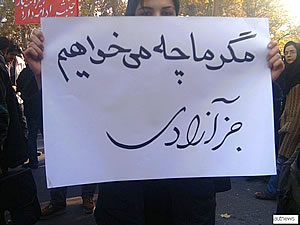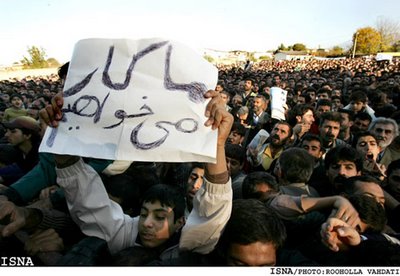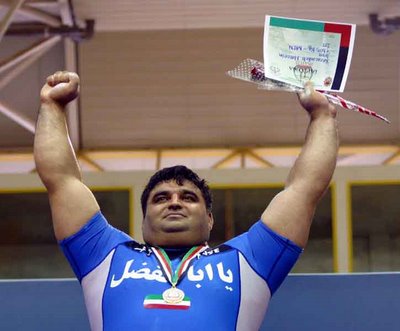Opening a dialogue with Iran and Syria may help ease the violence in Iraq, but it also could create new tensions and would perhaps further split an already deeply divided region, analysts said after the release of the Iraq Study Group report Wednesday.
The suggestion that the U.S. should "engage directly" with America's two most bitter foes in the region was one of the more radical recommendations of a report that called for sweeping changes in U.S. Middle East policy, including a renewed commitment to resolving the Israeli-Palestinian problem.
"Given the ability of Iran and Syria to influence events within Iraq and their interest in avoiding chaos in Iraq, the United States should try to engage them constructively," the report said, challenging one of the key tenets of U.S. policy in the region, which has frozen out both countries.
Addressing reporters after unveiling the report, former U.S. Rep. Lee Hamilton, a co-author, said he expected criticism of the recommendation but said the U.S. has no choice if it wants to resolve its Iraq problem.
"Iran probably today is the national power that has the single greatest influence inside Iraq," he said. "If you don't talk to them, we don't see much likelihood of progress being made. You cannot look at this area of the world and pick and choose among the countries that you're going to deal with."
It isn't clear, however, whether Iran and Syria will want to talk to the U.S.
Iran is riding high on a tide of Shiite revivalism, spearheaded by the election of a Shiite-dominated government in Iraq, the first Arab country in the region to be ruled by Shiites. Political gains for Shiites in Bahrain, Saudi Arabia and Lebanon, where Iran's ally Hezbollah has paralyzed the government with protests demanding a greater share of power, have been greeted with dismay by Sunni Arabs accustomed to dominating the region for the past 1,400 years.
With speculation rife that Iran may be within a few years of developing a nuclear weapon, leaders there may feel they have no real incentive to engage in a dialogue that would almost certainly require them to make compromises.
Iran may not want to talk
Report co-author James Baker said he recognized Iran may not be willing to talk. "We didn't get the feeling that Iran is champing at the bit to come to the table with us to talk about Iraq, and in fact, we say there we think they very well might not," he said. "But we also say we ought to put it to them, though, so that the world will see the rejectionist attitude that they are projecting by that action."
However, Iran wants to be recognized as a regional power, and its quest for status in the region would be bolstered by dialogue with the U.S., said Cyrus Shayegh, an Iran historian at American University of Beirut.
"From Iran's point of view, the U.S. is coming crawling back," he said. "The question is, what price will they ask?"
Speaking to reporters in Dubai on Tuesday, Iran's national security adviser, Ali Larijani, hinted that Iran would refuse to talk to the U.S. about Iraq. He also suggested Iran would not countenance dialogue on any subject until the U.S. sets a firm timetable for a withdrawal of its troops from Iraq.
It also isn't clear how much of a difference Iran could make in stopping the violence in Iraq. Its closest Iraqi allies are in the Supreme Council for the Islamic Revolution in Iraq, a group already committed to the U.S.-backed Iraqi government. SCIRI's top leader, Abdul Aziz al-Hakim, visited Washington this week, prompting speculation in the region that he is to serve as a conduit for indirect talks between Tehran and Washington.
One of the biggest troublemakers in Iraq is Moqtada Sadr, the anti-American Shiite cleric whose al-Mahdi Army is the most powerful in the country, with a force estimated at 60,000, according to the report.
But Sadr has had strained relations with Iran and does not exert full control over his undisciplined militia, making it unclear whether Iran could exert influence over him and whether he could curb his own group.
Rather, if U.S.-Iran talks do take place, there is a danger that the Sunni-led insurgency could intensify in response to the challenge posed by an accommodation between its two biggest enemies, said Mustafa al-Ani, director of Security and Terrorism Studies Program at the Dubai-based Gulf Research Center.
"What worries Arab Sunnis is that this report recognizes Iran as a power in Iraq, and any deal that recognizes Iran's role will deepen the gap between Sunnis and Shiites," he said. "This report means rewarding the troublemaker."
Arab states, already alarmed at the rising influence of Persian Iran in their territory, could feel compelled to step in and offer additional support to the insurgency, to counterbalance Iran and protect Sunni interests.
To counteract that, the report recommends setting up an Iraq International Support Group to include all of Iraq's neighbors as well as major world powers to coordinate ways to help Iraq and iron out regional rivalries.
Syria is likely to be more open to a dialogue with the U.S., though it is more doubtful whether Damascus would be in a position to dramatically change the course of events in Iraq, analysts say.
Little influence
Syria does not back any of the major factions in Iraq, leaving it with little influence over internal Iraqi affairs. The report says it could do more to prevent insurgents and weapons crossing its porous borders.
But Syria's fortunes, unlike those of Iran, have been waning since it was forced to remove its forces from Lebanon last year. It could well be tempted to talk by a proposal in the report that Israel return the occupied Golan Heights as part of a comprehensive Middle East peace settlement.
"Syria is isolated in the region and they need to talk to the U.S. as much as the U.S. needs to talk to them," said Faleh Jabar, director of the Iraqi Institute of Strategic Studies.
Engaging Syria, Iran's only Arab ally, would in turn undermine Iran's influence in the region, and possibly force it to the negotiating table, he said.
"If you engage Syria in talks, it would draw Syria away from Iran, and Iran would be weakened," he said, speaking in Beirut. "Syria is the key."





































